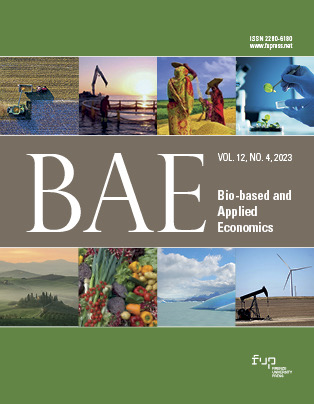Published 2023-12-31
Keywords
- organic farming,
- farm model,
- IFM-CAP,
- Farm to Fork strategy,
- EU Green Deal
- EU ...More
How to Cite
Copyright (c) 2023 Dimitrios Kremmydas, Pavel Ciaian, Edoardo Baldoni

This work is licensed under a Creative Commons Attribution 4.0 International License.
Abstract
This paper analyses the impacts of the Farm to Fork strategy (F2F) target of 25% organic farmland by 2030 in the EU using a farm level model. Two approaches are deployed to model conversion to organic agriculture. The first one, the endogenous approach, operates under the assumption that farm conversions to organic production result from assessing the utility difference between organic and conventional production systems. The exogenous approach relies on econometric estimation of the likelihood of farms to convert to organic driven by a combination of monetary and non-monetary drivers. The simulated impacts of the F2F target at the EU level vary depending on the chosen methodology. Gross income changes range from +3.8% under the endogenous approach to -1.3% under the exogenous approach. Both approaches forecast decreased production (-0.5% to -15%) for most crops and animal products upon achieving the organic target.






